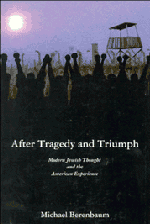Book contents
- Frontmatter
- Contents
- Foreword
- Introduction
- PART I THE HOLOCAUST IN CONTEMPORARY AMERICAN CULTURE
- 1 The Nativization of the Holocaust
- 2 The Uniqueness and Universality of the Holocaust
- 3 Public Commemoration of the Holocaust
- 4 Is the Centrality of the Holocaust Overemphasized? Two Dialogues
- 5 Issues in Teaching the Holocaust
- 6 What We Should Teach Our Children
- 7 The Shadows of the Holocaust
- PART II JEWISH THOUGHT AND MODERN HISTORY
- Notes
- Index
4 - Is the Centrality of the Holocaust Overemphasized? Two Dialogues
Published online by Cambridge University Press: 06 January 2010
- Frontmatter
- Contents
- Foreword
- Introduction
- PART I THE HOLOCAUST IN CONTEMPORARY AMERICAN CULTURE
- 1 The Nativization of the Holocaust
- 2 The Uniqueness and Universality of the Holocaust
- 3 Public Commemoration of the Holocaust
- 4 Is the Centrality of the Holocaust Overemphasized? Two Dialogues
- 5 Issues in Teaching the Holocaust
- 6 What We Should Teach Our Children
- 7 The Shadows of the Holocaust
- PART II JEWISH THOUGHT AND MODERN HISTORY
- Notes
- Index
Summary
Dialogue has long been an indispensable form of theological engagement. This chapter presents two dialogues. In the first, Arnold Wolf (then at Yale University) and I debate the appropriate place of the Holocaust in American Jewish life. In the second dialogue, I respond to David Weiss, an Orthodox rabbi, who argues that the Holocaust should have no impact on Jewish faith.
Both Wolf and Weiss seek to minimize the implications of the Holocaust by removing it from the public life and religious faith of contemporary Jews. Weiss's defense of the covenant's eternity is the antithesis of my own views that the relationship between God and the people of Israel evolves in time and is transformed by history, most especially by the revolutionary events of recent Jewish experience.
“The Centrality of the Holocaust is a Mistake,” by Arnold Jacob Wolf
There is one thing that is worse than too much talk about the Holocaust and that is hearing people say there is too much talk. That is my situation.
When I left Congregation Solel in Chicago, I expected to be offered hundreds of jobs, but I was offered two. One was with the commission directly related to the Holocaust – because I had spent fifteen years producing a congregational study of the Holocaust, which was unusual, perhaps unique, in the country, and I involved Elie Wiesel and Raul Hilberg in that study as long as twenty-two years ago. The other job I was offered was at B'nai B'rith Hillel at Yale. In a way, the choice I faced is symbolic of what I have to say: The problem is an overweening concern with the Holocaust as opposed to other concerns.
- Type
- Chapter
- Information
- After Tragedy and TriumphEssays in Modern Jewish Thought and the American Experience, pp. 43 - 60Publisher: Cambridge University PressPrint publication year: 1990

